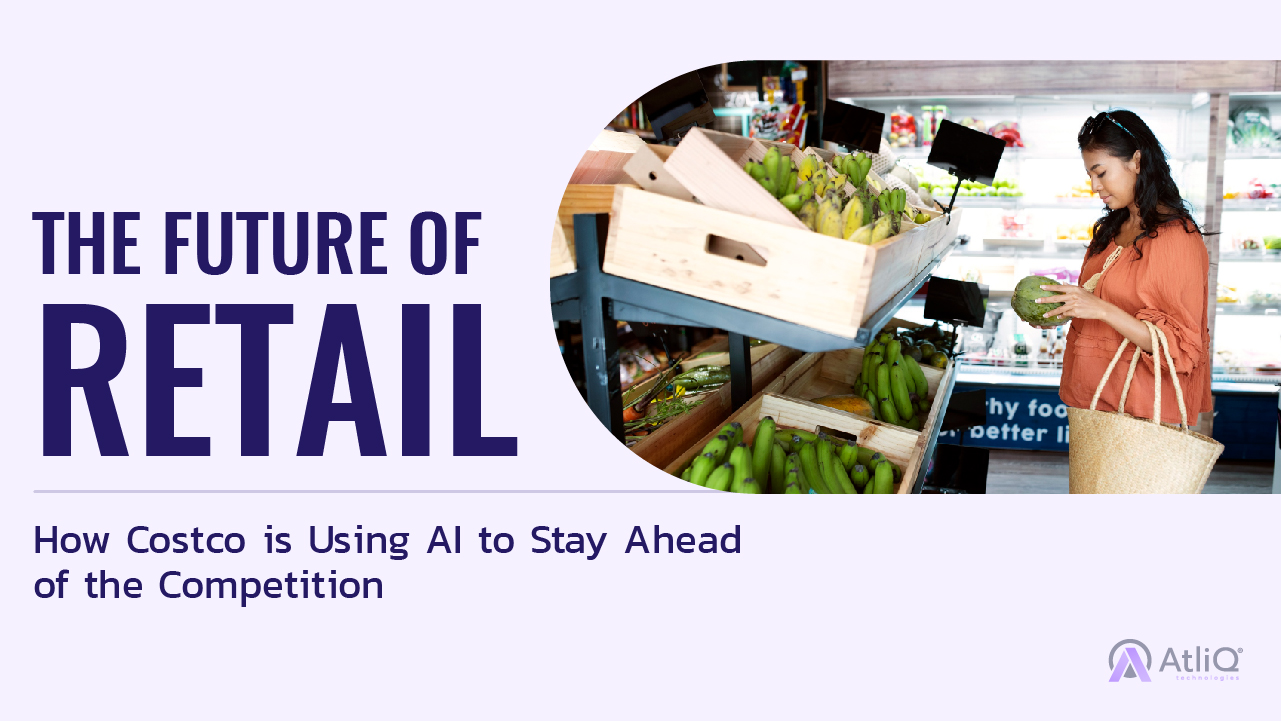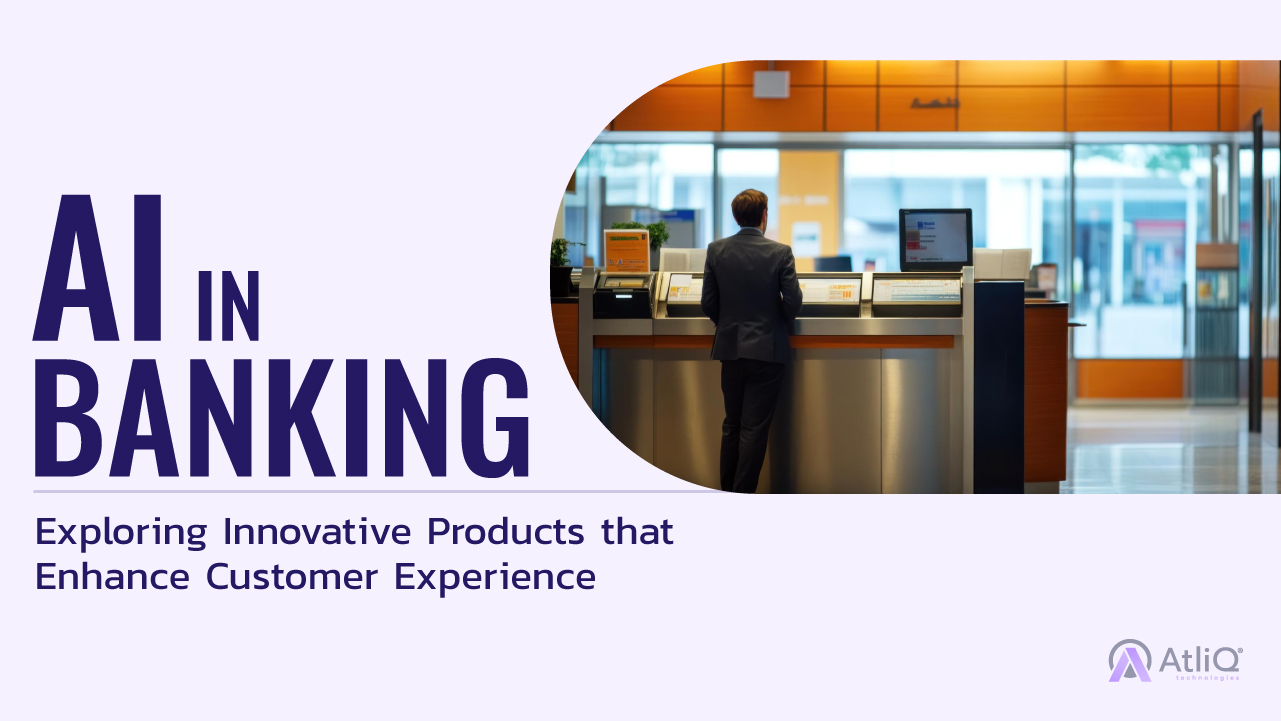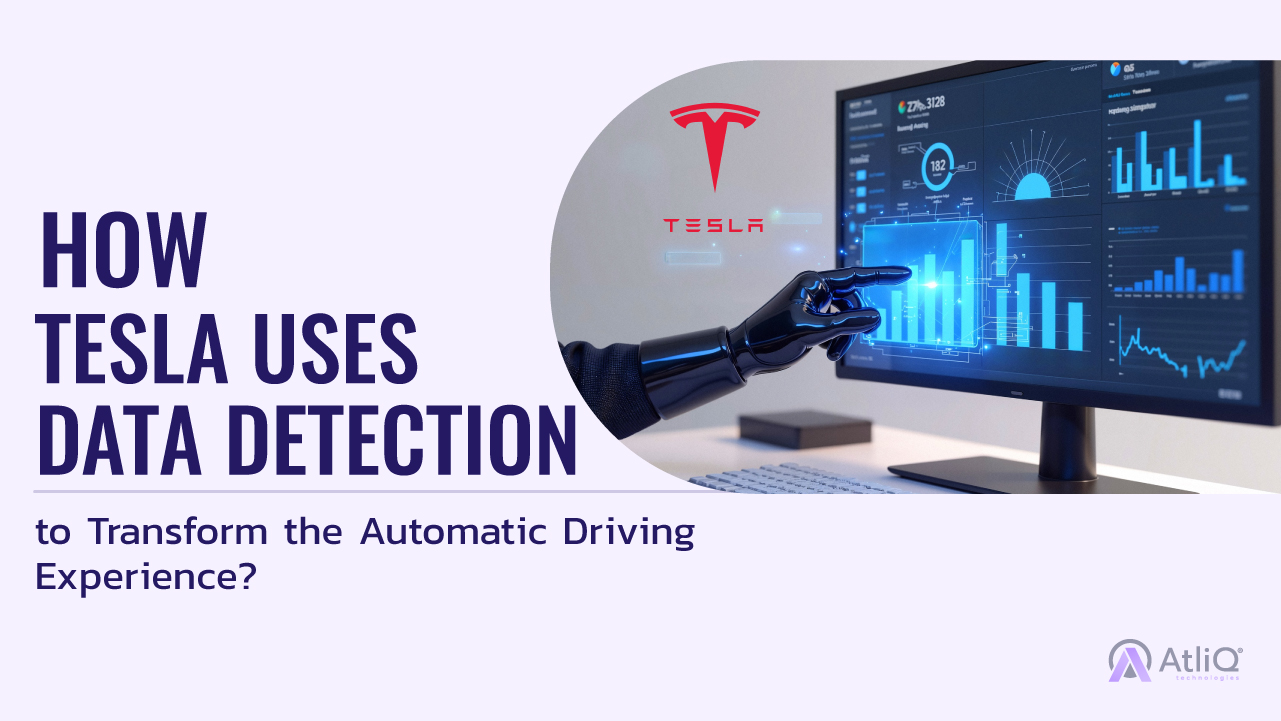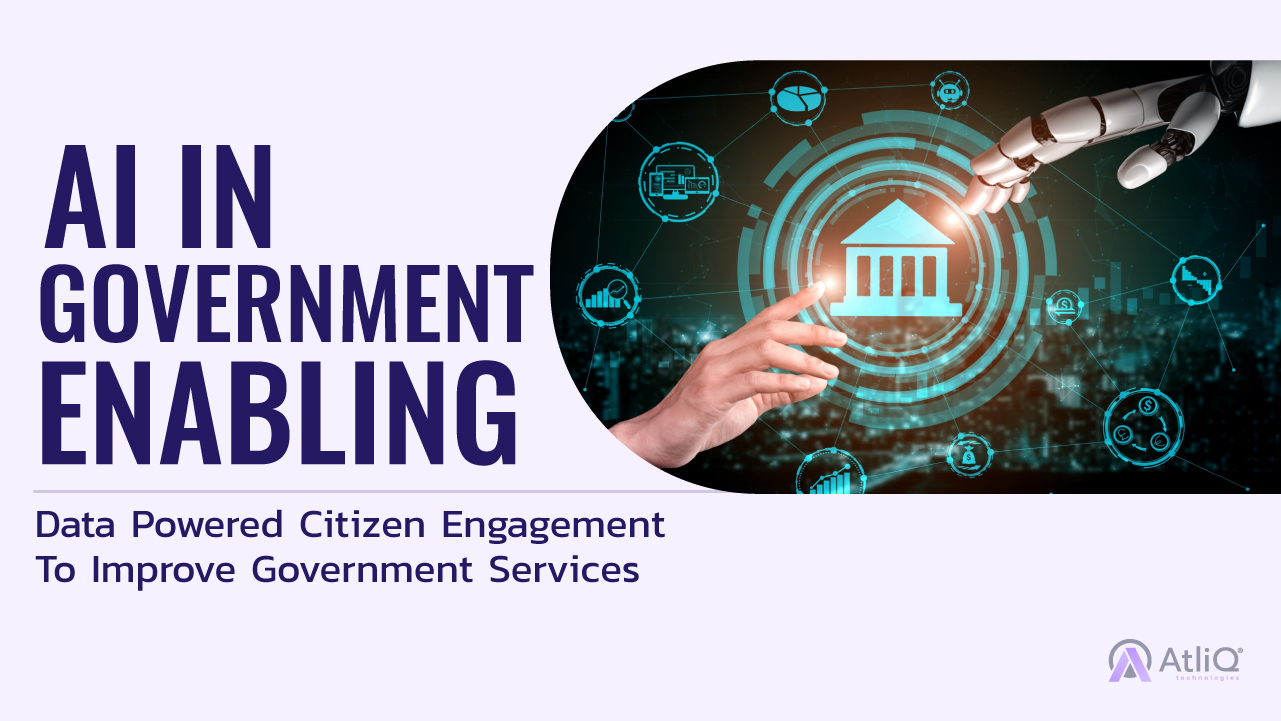
Imagine a world where government services are not only efficient but also proactive, anticipating citizens’ needs before they even arise. This vision is rapidly becoming a reality, fueled by the transformative power of Artificial Intelligence (AI). In 2023, the global AI market for government services is already a staggering $20.67 billion, and it’s set to soar. With a projected compound annual growth rate (CAGR) of 16.9%, the market is expected to more than double, reaching an impressive $51.78 billion by 2030. This growth isn’t just about numbers—it’s about revolutionizing how governments operate, making them smarter, more responsive, and more efficient than ever before.
Definition of AI Applications in Government
AI in government refers to the use of advanced algorithms and machine learning to enhance public services, streamline operations, and improve decision-making. The scope of AI applications is broad, encompassing areas like data analysis, predictive modeling, automation of routine tasks, and real-time response systems. Governments are leveraging AI to optimize resource allocation, improve citizen engagement through chatbots, enhance public safety with predictive policing, and even automate administrative processes, reducing human error and operational costs. As AI technology continues to evolve, its applications in government are expanding, transforming how public services are delivered.
Key Benefits of AI for Government Operations
AI is rapidly transforming the landscape of government operations, offering a range of benefits that are redefining efficiency, decision-making, cost management, and transparency.
- Enhanced Efficiency: AI streamlines administrative processes by automating routine tasks, such as data entry, document processing, and customer service inquiries. This automation not only speeds up workflows but also significantly reduces the workload on government employees, allowing them to focus on more complex and strategic tasks. The result is a more agile and responsive government capable of delivering services faster and more accurately.
- Improved Decision-Making: With AI-driven data analytics, governments can access real-time insights that empower better policy formulation and strategic planning. By analyzing vast amounts of data, AI can identify patterns and trends that might otherwise go unnoticed, enabling leaders to make informed decisions that are based on solid evidence rather than intuition alone. This data-driven approach leads to more effective policies and programs that better meet the needs of citizens.
- Cost Savings: One of the most significant advantages of AI is its ability to reduce operational costs. By automating processes that traditionally required significant human resources, AI helps governments cut down on labor expenses, minimize errors, and optimize resource allocation. This efficiency leads to substantial cost savings, which can then be redirected towards other critical public services and initiatives.
- Increased Transparency: AI tools are instrumental in enhancing transparency within government operations. By enabling more accurate tracking, monitoring, and auditing of processes, AI ensures that all actions are documented and accessible, reducing the risk of corruption and improving public trust. This transparency also allows for better accountability, as AI systems can provide clear records of decisions and actions taken by government officials.
Overall, AI is not just a technological upgrade for governments; it’s a powerful tool that can fundamentally improve how public services are delivered, making them more efficient, cost-effective, and transparent.
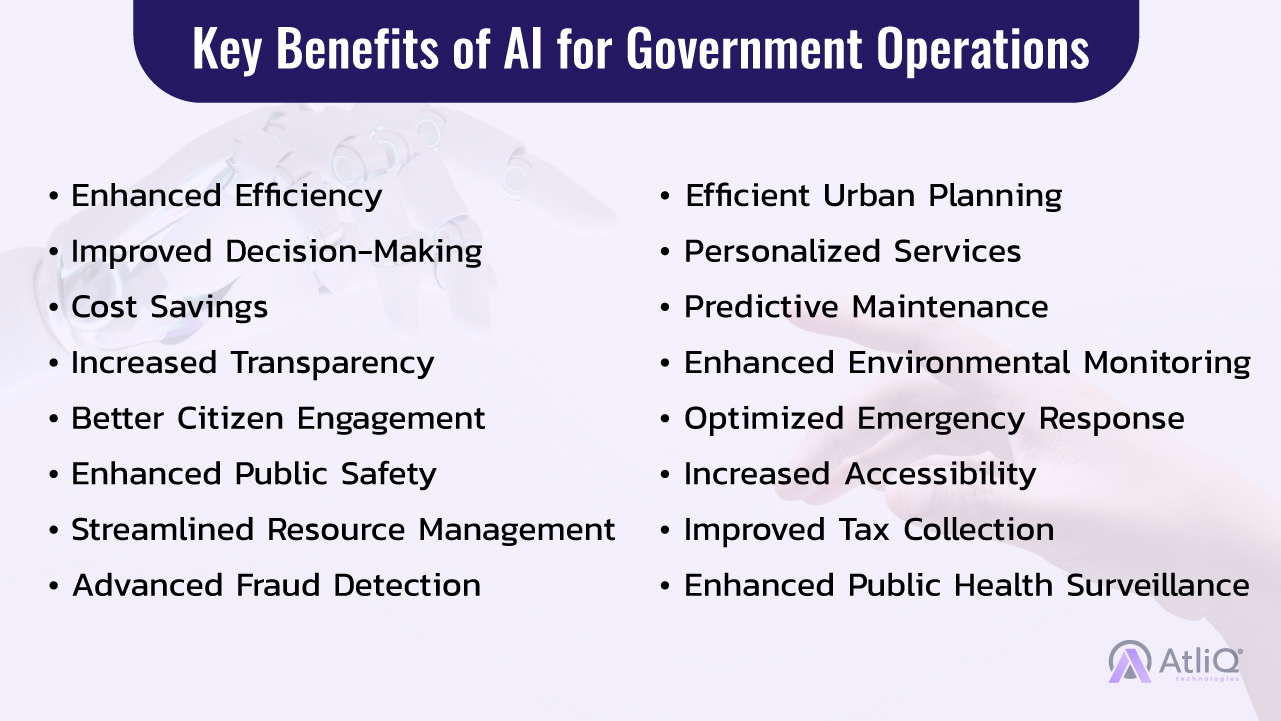
Case Studies and Real-World Applications
AI in Public Safety: AI is revolutionizing public safety by enabling predictive policing, where algorithms analyze data to identify crime hotspots and forecast potential incidents before they occur. For example, cities like Los Angeles have implemented AI-powered systems to allocate police resources more effectively, resulting in significant reductions in crime rates. Additionally, AI-driven emergency response systems can analyze real-time data from multiple sources—such as social media, 911 calls, and traffic cameras—to optimize the dispatch of emergency services, ensuring faster and more efficient responses to crises.
AI in Healthcare: In the healthcare sector, AI is being used to manage and analyze vast amounts of patient data, leading to better outcomes and more personalized care. For instance, AI algorithms can predict patient admission rates and optimize staffing levels in hospitals, ensuring that resources are allocated where they’re needed most. In countries like the United Kingdom, AI is also being used to identify high-risk patients and streamline the allocation of medical supplies, reducing waste and improving overall healthcare efficiency.
AI in Transportation: AI is playing a crucial role in transforming transportation systems worldwide. Smart traffic management systems, powered by AI, analyze real-time data from traffic cameras, sensors, and GPS devices to optimize traffic flow, reduce congestion, and improve road safety. In cities like Singapore, AI is used to manage traffic lights dynamically, adapting to current traffic conditions and significantly reducing travel times. Additionally, AI is enhancing logistics operations by optimizing delivery routes and schedules, ensuring faster and more efficient movement of goods.
AI in Citizen Services: Governments are increasingly using AI to improve citizen services through virtual assistants and automated service requests. AI-powered chatbots, for example, are helping citizens access information and complete transactions without human intervention, providing 24/7 support and reducing wait times. Countries like Estonia have implemented virtual assistants that guide citizens through complex processes such as tax filings and permit applications, making government services more accessible and user-friendly.
These real-world applications of AI demonstrate its transformative potential in enhancing the efficiency, responsiveness, and quality of government operations. By leveraging AI, governments can not only improve public services but also create a safer, healthier, and more connected society.
Challenges and Considerations
While AI offers significant benefits for government operations, it also presents unique challenges that must be carefully addressed.
- Data Privacy: Governments must ensure that AI systems are designed with robust security measures to protect sensitive data. Compliance with privacy regulations is critical, as the misuse or mishandling of data can lead to serious legal and ethical issues.
- Bias & Fairness: AI algorithms can sometimes reflect or even amplify existing biases in data, leading to unfair outcomes. Addressing these biases requires ongoing monitoring and adjustments to ensure that AI-driven decisions are equitable and just.
- Integration Issues: Implementing AI solutions often involves integrating them with existing legacy systems. This process can be complex and costly, requiring careful planning to avoid disruptions and ensure seamless operation.
- Training & Skill Development: As AI becomes more prevalent in government, employees need to be trained to understand and effectively use these new technologies. Developing the necessary skills and knowledge is crucial for successful AI adoption and maximizing its potential benefits.
The integration of AI into government operations is not just a trend—it’s a transformative shift that holds the promise of revolutionizing public services. From enhancing efficiency and decision-making to reducing costs and increasing transparency, AI offers a multitude of benefits that can significantly improve how governments serve their citizens. However, this transformation comes with challenges, such as ensuring data privacy, addressing algorithmic biases, and effectively integrating new technologies with existing systems. By carefully navigating these challenges and investing in training and skill development, governments can harness the full potential of AI, paving the way for more responsive, efficient, and equitable public services. As AI technology continues to evolve, its role in government will undoubtedly expand, creating new opportunities to optimize operations and enhance the quality of life for citizens worldwide.
